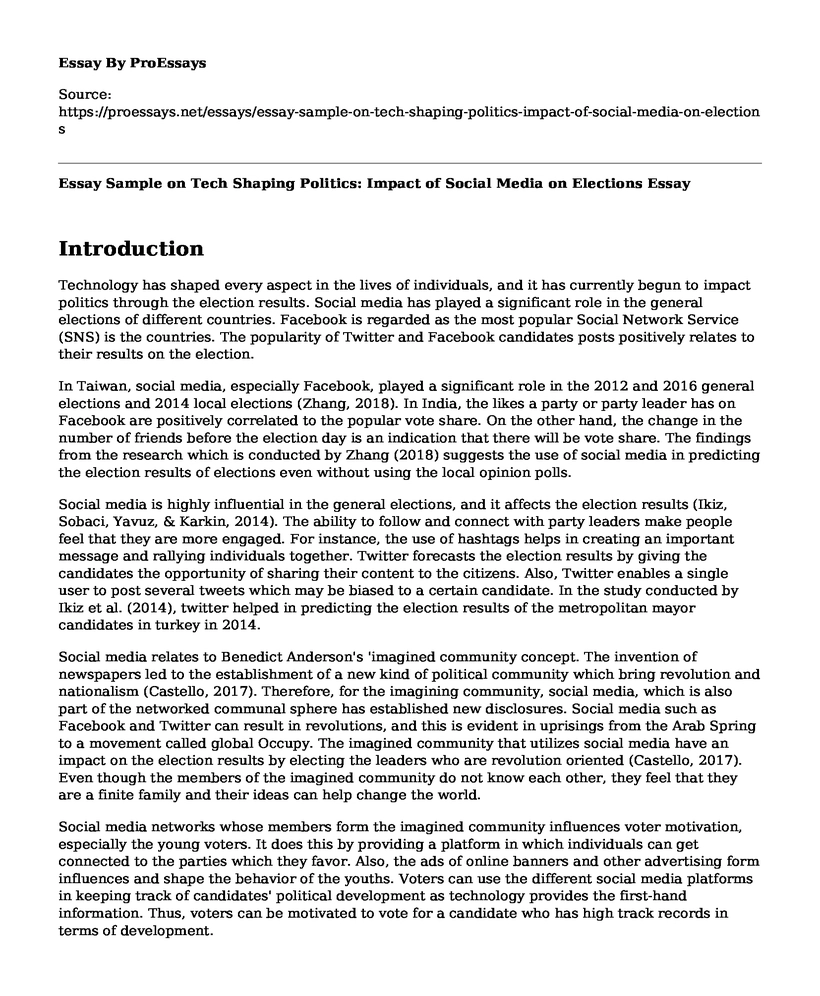Introduction
Technology has shaped every aspect in the lives of individuals, and it has currently begun to impact politics through the election results. Social media has played a significant role in the general elections of different countries. Facebook is regarded as the most popular Social Network Service (SNS) is the countries. The popularity of Twitter and Facebook candidates posts positively relates to their results on the election.
In Taiwan, social media, especially Facebook, played a significant role in the 2012 and 2016 general elections and 2014 local elections (Zhang, 2018). In India, the likes a party or party leader has on Facebook are positively correlated to the popular vote share. On the other hand, the change in the number of friends before the election day is an indication that there will be vote share. The findings from the research which is conducted by Zhang (2018) suggests the use of social media in predicting the election results of elections even without using the local opinion polls.
Social media is highly influential in the general elections, and it affects the election results (Ikiz, Sobaci, Yavuz, & Karkin, 2014). The ability to follow and connect with party leaders make people feel that they are more engaged. For instance, the use of hashtags helps in creating an important message and rallying individuals together. Twitter forecasts the election results by giving the candidates the opportunity of sharing their content to the citizens. Also, Twitter enables a single user to post several tweets which may be biased to a certain candidate. In the study conducted by Ikiz et al. (2014), twitter helped in predicting the election results of the metropolitan mayor candidates in turkey in 2014.
Social media relates to Benedict Anderson's 'imagined community concept. The invention of newspapers led to the establishment of a new kind of political community which bring revolution and nationalism (Castello, 2017). Therefore, for the imagining community, social media, which is also part of the networked communal sphere has established new disclosures. Social media such as Facebook and Twitter can result in revolutions, and this is evident in uprisings from the Arab Spring to a movement called global Occupy. The imagined community that utilizes social media have an impact on the election results by electing the leaders who are revolution oriented (Castello, 2017). Even though the members of the imagined community do not know each other, they feel that they are a finite family and their ideas can help change the world.
Social media networks whose members form the imagined community influences voter motivation, especially the young voters. It does this by providing a platform in which individuals can get connected to the parties which they favor. Also, the ads of online banners and other advertising form influences and shape the behavior of the youths. Voters can use the different social media platforms in keeping track of candidates' political development as technology provides the first-hand information. Thus, voters can be motivated to vote for a candidate who has high track records in terms of development.
Conclusion
In conclusion, social media which has imagined community members plays a significant role in the election results and motivation of voters. The mainly used social media networks are Facebook and Twitter, and the election results can be predicted through the number of likes and tweets they have in their accounts. Social media relates to Benedict Anderson's 'imagined community concept by helping in the creation of revolution.
References
Biswas, A., Ingle, N., & Roy, M. (2014). Influence of social media on voting behavior. Journal of Power, Politics & Governance, 2(2), 127-155. http://jppgnet.com/journals/jppg/Vol_2_No_2_June_2014/7.pdf
Castello, E. (2017). Anderson and the Media. The strength of "imagined communities". Debats. Revista de cultura, poder i societat, 1. file:///C:/Users/User/Downloads/94-282-2-PB.pdf
Ikiz, O. O., Sobaci, M. Z., Yavuz, N., & Karkin, N. (2014, October). Political use of Twitter: The case of metropolitan mayor candidates in 2014 local elections in Turkey. In Proceedings of the 8th international conference on theory and practice of electronic governance (pp. 41-50). ACM. Doi: 10.1145/2691195.2691219
Zhang, X. (2018). Social media popularity and election results: A study of the 2016 Taiwanese general election. PloS one, 13(11), e0208190. https://doi.org/10.1371/journal.pone.0208190
Cite this page
Essay Sample on Tech Shaping Politics: Impact of Social Media on Elections. (2023, Jan 30). Retrieved from https://proessays.net/essays/essay-sample-on-tech-shaping-politics-impact-of-social-media-on-elections
If you are the original author of this essay and no longer wish to have it published on the ProEssays website, please click below to request its removal:
- Global Cities and Governance Essay Example
- US Strategy in the Sahel Region: AFRICOM Workbook Analysis - Research Paper
- Movie Analysis Essay on Big Short
- Essay Sample on Government Policies for Effective Response to Global Pandemic
- Essay on Religious Freedom: Embracing Diversity & Respect for All.
- Native Filmmakers: New Approaches to Cultural Criticism - Essay Sample
- Essay Example on Comparing Protagonist Themes in 'Whale Rider', 'Farewell', & 'Moonlight'







